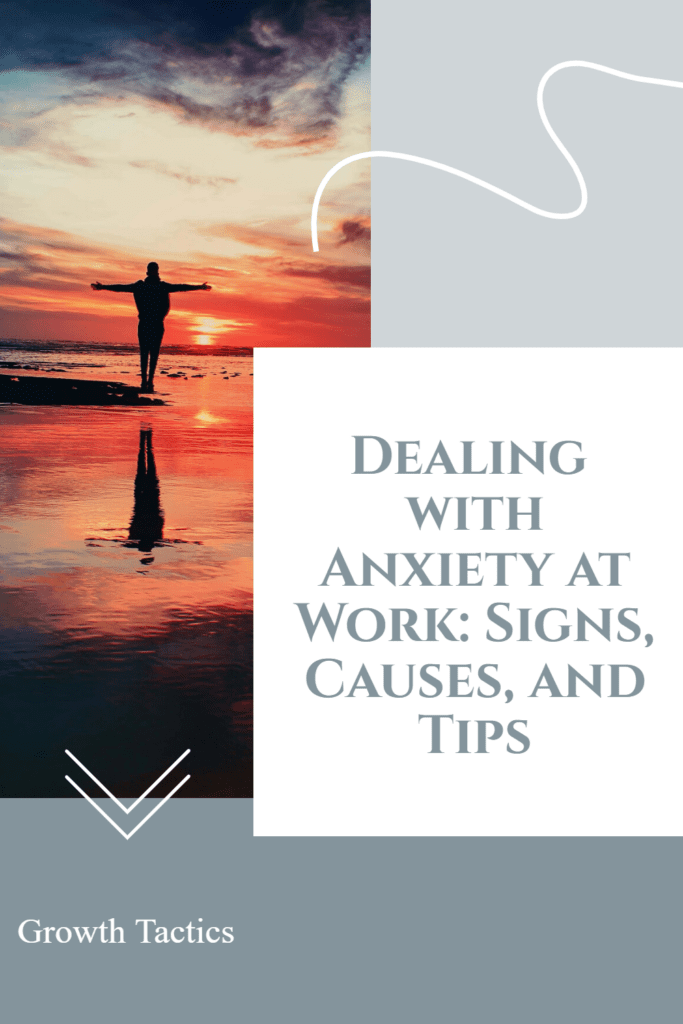Welcome to our comprehensive guide on dealing with anxiety at work. In today’s fast-paced and demanding work environment, it’s common for many people to experience anxiety and stress.
Whether it’s the pressure of meeting deadlines, coping with work-related challenges, or handling workplace dynamics, anxiety can have a significant impact on our mental well-being and overall productivity.
This guide aims to provide you with practical strategies and expert advice on managing anxiety at work, so you can thrive professionally and maintain a healthy work-life balance.
Jump To Section
Understanding Anxiety at Work: Causes and Symptoms
We all experience stress at work from time to time, but sometimes that stress can bubble over into anxiety. According to the Anxiety and Depression Association of America, anxiety disorders are the most common mental illness in the U.S., affecting 40 million adults every year. While anxiety at work is a common issue, it can be challenging to navigate without understanding its causes and symptoms.
Causes of Anxiety at Work
Work-related anxiety can stem from a variety of sources, including:
1. High Demands and Low Control
Work environments that require employees to juggle multiple tasks with little control over their workflow can be a significant source of anxiety. When employees feel as if they have no say in their work process, it can lead to feelings of helplessness and loss of agency.
2. Poor Work-Life Balance
Maintaining a healthy work-life balance is essential for preventing work-related anxiety. When work bleeds into personal time, and there’s no clear boundary separating the two, it can lead to feelings of overwhelm, stress, and burnout.
3. Toxic Work Culture
A workplace culture that fosters competition, hostility, and bullying can cause significant anxiety in employees. When company values and behaviors contradict an employee’s personal values and morals, it can lead to feelings of alienation, anxiety, and depression.
4. Job Insecurity
Feeling as if one’s job is in peril, whether due to layoffs, downsizing, or budget cuts, can cause significant anxiety in employees. It can lead to feelings of uncertainty, insecurity, and an overall sense of instability.
Symptoms of Anxiety at Work
Anxiety at work can manifest in several ways, including:
1. Physical Symptoms
Physical symptoms of work-related anxiety can include dizziness, sweating, heart palpitations, headaches, and stomachaches. These physical symptoms can interfere with daily work activities and exacerbate existing anxiety.
2. Emotional Symptoms
Work-related anxiety can lead to feelings of irritability, anger, sadness, and isolation. These emotional symptoms can cause employees to disengage from their work and experience decreased job satisfaction.
3. Cognitive Symptoms
Work-related anxiety can interfere with an employee’s cognitive abilities, including their ability to concentrate, remember information, and make decisions. These cognitive symptoms can lead to poor performance and decreased productivity.
4. Behavioral Symptoms
Behavioral symptoms of work-related anxiety can include avoiding certain tasks or responsibilities, withdrawing from the team, or engaging in risky behaviors like substance abuse or gambling.
By understanding the causes and symptoms of work-related anxiety, employees can better manage their mental health and advocate for healthy work practices.
Tips for Managing Anxiety at Work
These strategies will empower you to regain control and create a healthier work environment for yourself.
1. Recognize and Challenge Negative Thoughts
Anxiety often stems from negative thinking patterns and irrational beliefs. Learn to identify these thoughts and challenge their validity. Ask yourself if there’s any evidence supporting them and try to reframe them into more positive and realistic perspectives.
2. Practice Self-care
Taking care of yourself outside of work is crucial for managing anxiety at work. Engage in activities that bring you joy and relaxation. Regular exercise, sufficient sleep, and a healthy diet can also contribute to improving your overall resilience and well-being.
3. Break Tasks into Manageable Steps
Feeling overwhelmed by a never-ending to-do list can intensify anxiety. Break tasks into smaller, manageable steps. Prioritize tasks based on their deadlines or importance, and celebrate accomplishments along the way. Remember, progress is progress, no matter how small.
4. Utilize Stress-Management Techniques
Explore various stress-management techniques to find what works best for you. Deep breathing exercises, mindfulness meditation, and practicing gratitude are just a few ways to reduce stress levels and promote a sense of calmness and clarity amidst work-related challenges.
5. Communicate with Your Employer
If workplace factors are contributing to your anxiety, consider having an open conversation with your employer or supervisor. Explain your concerns and explore potential solutions together. Your employer may be supportive and willing to make reasonable accommodations to create a more conducive and less stressful work environment.
6. Foster Supportive Relationships
Creating strong relationships with your colleagues can provide a sense of camaraderie and support in the workplace. Seek opportunities to connect with your coworkers, whether through team-building activities or informal chats during breaks. Having a support system at work can help alleviate stress and create a more positive and collaborative work environment.
7. Practice Mindfulness throughout the Day
Mindfulness involves being fully present in the moment and intentionally focusing on your thoughts, emotions, and surroundings. Incorporate moments of mindfulness throughout your workday by taking a few deep breaths, observing your surroundings, and grounding yourself in the present moment. This practice can help reduce anxiety and enhance your overall well-being.
8. Set Boundaries
In today’s hyperconnected world, it can be challenging to disconnect from work. Set clear boundaries between your personal and professional life. Avoid checking emails or engaging in work-related tasks outside of designated work hours. By creating space for non-work activities and relaxation, you can mitigate work-related anxiety and enjoy a more balanced lifestyle.
9. Practice Positive Self-Talk
The way we speak to ourselves has a profound impact on our mental well-being. Replace self-defeating thoughts with positive and encouraging self-talk. Remind yourself of your capabilities, strengths, and past successes. Building a positive inner dialogue can boost your confidence and resilience in the face of work-related challenges.
10. Seek Support from a Mentor or Trusted Colleague
Having someone you trust to confide in can make a significant difference in managing anxiety at work. Seek a mentor or a trusted colleague who can provide guidance, advice, and a listening ear when needed. Knowing that you have a support system within the workplace can help alleviate feelings of isolation and anxiety.
11. Practice Stress-Relieving Activities Outside of Work
Engaging in activities that promote relaxation and stress relief outside of work is crucial for managing anxiety. Explore hobbies such as yoga, painting, reading, listening to music, or spending time in nature. Taking care of your mental well-being beyond the workplace can have a positive impact on your overall resilience and ability to cope with stress.
12. Celebrate Small Accomplishments
Acknowledge and celebrate your achievements, no matter how small they may seem. Recognizing and rewarding yourself for meeting deadlines, completing tasks, or achieving milestones can boost your self-confidence and motivation. Remember, every step forward deserves recognition and serves as a testament to your abilities.
13. Embrace a Growth Mindset
Adopting a growth mindset can help reduce anxiety by reframing failures or setbacks as opportunities for growth and learning. Instead of dwelling on mistakes, focus on what you can learn from them and how you can improve in the future. This shift in perspective can alleviate anxiety and foster a more resilient mindset.
14. Practice Effective Communication
Clear and open communication is essential for minimizing workplace anxiety. Express your needs, concerns, and boundaries with your colleagues and superiors. Don’t hesitate to ask for clarification or support when needed. By fostering honest and transparent communication, you can reduce misunderstandings and promote a healthier work environment.
15. Prioritize Self-Care Outside of Work
Taking care of your well-being outside of work is just as important as managing anxiety at work. Dedicate time to activities that bring you joy, relaxation, and fulfillment. Practice self-care rituals such as taking soothing baths, reading a book, or enjoying a hobby. By nurturing yourself, you’ll have greater resilience to cope with work-related stress.
Seeking Professional Help
It’s normal to feel anxious at work from time to time, but when that anxiety starts interfering with your daily life and overall well-being, it may be time to consider seeking professional help. By reaching out to licensed therapists or counselors who specialize in anxiety disorders, you can gain access to valuable guidance and support specifically tailored to your needs.
Guided Support from Anxiety Experts
When you consult with a professional, you benefit from their knowledge and expertise in anxiety disorders. These professionals have dedicated their careers to understanding the intricacies of anxiety and how it can affect various aspects of our lives, including our work. With their guidance, you can gain a better understanding of your anxiety, identify triggers, and develop effective coping mechanisms.
Tailored Strategies for Managing Anxiety
Anxiety is a deeply personal experience, and what works for one person may not work for another. When seeking professional help, you can expect to receive personalized strategies for managing your anxiety at work.
These strategies may involve exploring the root causes of your anxiety, identifying and challenging negative thought patterns, and implementing relaxation techniques tailored to your specific needs. Through ongoing therapy sessions, you can learn to manage anxiety in a way that works best for you.
A Sign of Strength and Self-Care
Seeking professional help for anxiety at work is not a weakness but rather a powerful display of strength and self-care. It takes courage to recognize when your mental health needs support, and by taking this step, you are prioritizing your well-being and happiness.
Remember, even the most successful and accomplished individuals seek professional help when needed because they understand the value of investing in their mental health.
Conclusion
Managing anxiety at work is a journey that requires self-awareness, resilience, and a proactive approach. By implementing the strategies outlined in this guide and seeking professional help when necessary, you can regain control over your mental well-being and thrive in your professional life.
Remember, you are not alone in this journey, and with the right support and tools, you can overcome anxiety at work and create a healthier, more fulfilling work experience.


